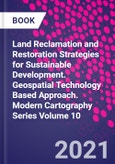Land Reclamation and Restoration Strategies for Sustainable Development: Geospatial Technology Based Approach, Volume Ten covers spatial mapping, modeling and risk assessment in land hazards issues and sustainable management. Each section in the book explores state-of-art techniques using commercial, open source and statistical software for mapping and modeling, along with case studies that illustrate modern image processing techniques and computational algorithms. A special focus is given on recent trends in data mining techniques. This book will be of particular interest to students, researchers and professionals in the fields of earth science, applied geography, and those in the environmental sciences.
Please Note: This is an On Demand product, delivery may take up to 11 working days after payment has been received.
Table of Contents
1. Emergence and challenges of land reclamation: issues and prospect
2. Stages of land reclamation and their impact on the fluvio-geomorphological environment of Indian Sundarbans with special reference to Matla-Bidyadhari Interfluve
3. Catchment health degradation resulting from urban expansion using remote sensing and GIS techniques in parts of South Africa
4. A geospatial appraisal of urban expansion within the Teesta-Mahananda interfluve in and around Siliguri town, West Bengal, India
5. Wasteland reclamation and geospatial solution: existing scenario and future strategy
6. Mapping of wastelands and significance of morphometric analysis in wasteland management
a remote sensing and GIS approach
7. Land reclamation open cast coal mine under semiarid conditions
a field-based observation
8. Assessment of mining derelict land using multicriteria decision-making technique and approaches toward sustainable regeneration
a case study in Jamuria CD block, West Bengal (India)
9. Alternative use of abandoned mines for geotourism: a case study using geoinformatics
10. A geospatial approach to analyze the stability of mine overburden dump over reclaimed land
11. Assessment of heavy metal soil pollution in the agricultural land of North Western Bangladesh
12. High volume fly ash utilization for reclamation of wastelands with special reference to mine spoil and ash back-haul areas for agriculture and forestry
13. GIS-based assessment for agricultural susceptibility and sustainability to meteorological drought in West Bengal
14. Land suitability assessment for effective agricultural practices in Paschim Medinipur and Jhargram districts, West Bengal, India
15. Land reclamation, management, and planning in coastal region: a geoinformatics approach
16. Evaluation of long-term shoreline changes between Rasulpur and Subarnarekha estuary, east coast of India using remote sensing and GIS techniques
17. Mangrove sensitivities to climate change and its impacts in the Sundarbans: a case study in the Patibania Island of south western Sundarbans, India
18. An empirical study on mangrove restoration in Indian Sundarbansda community-based environmental approach
19. Forest land degradation and restoration: lessons from historical processes and contemporary advances
20. Forest land degradation and reclamation process in Indian Sundarbans: a case study
21. Monitoring and changing pattern of shifting cultivation and reclamation in hilly regions using Geospatial Technology
22. Afforestation, revegetation, and regeneration: a case study on Purulia district, West Bengal (India)
23. Land restoration strategies to mitigate the problems of shrinkage of wetlands in West Bengal
24. Conflict between land reclamation and natural channels: case of Greater Mohali region
25. Land reclamation and reuse of waste water on the backdrop of urban sprawl of Kolkata metropolitan: a case study of East Kolkata, Wetland, India
26. Wetland formation and reclamation in the flood prone areas: a case study in Bihar, India
27. Land use land cover dynamics with the outgrowth of Burdwan town (India): problems with sustainable solutions
28. Quantification of decadal deforestation and afforestation scenario in Bankura District of West Bengal using geospatial techniques
29. Rainwater harvesting potential in Nagaland, India
30. Appraisal of ecosystem services and forest resource conservation in a tropical dry deciduous forest of Aravallis, India
31. Challenges of land reclamation for Teesta River victims: sustainable management policy for reclaimed land
32. Geospatial technology in salt-affected land assessment and reclamation
33. Locally informed "remediation" interventions: lessons of community (co)engagement from semi-arid Bundelkhand, India








